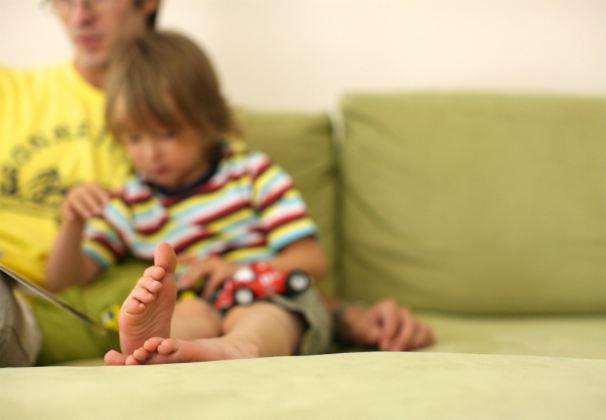Autistic spectrum disorders (ASDs)

Published by Bupa's Health Information Team, October 2011.
This factsheet is for parents of children with an autistic spectrum disorder (ASD), or people who would like information about it including the symptoms, causes and treatments.
ASDs are a group of lifelong conditions that affect how a person communicates with and relates to other people.
This factsheet is relevant for both parents of children with an ASD and adults who have the condition. However, for simplicity, we will refer to your child throughout.
About autistic spectrum disorders
Symptoms of autistic spectrum disorders
Causes of autistic spectrum disorders
Diagnosis of autistic spectrum disorders
Treatment of autistic spectrum disorders
Help and support
About autistic spectrum disorders
According to the National Autistic Society, around one in 100 people in the UK have an ASD. ASDs include conditions such as autism and Asperger syndrome. The word 'spectrum' is used because the symptoms of ASDs vary widely in nature and severity between people who are affected.
Generally, children who have an ASD don't develop the social and language skills that other children of the same age do. As a result, they find relating to other people difficult. Children with an ASD may also have unusual behaviours and learning disabilities.
Autism
Children with autism have difficulty communicating and interacting with others. This is often first noticed by the age of two. Some children with autism may have a learning disability, such as dyslexia (a condition that hinders the development of language-based skills, including reading, spelling and writing). Autism is more common in boys than girls.
Asperger syndrome
Asperger syndrome is similar to autism, but is usually less severe. Children with Asperger syndrome generally communicate better than those with autism and have average or above average intelligence. They don't usually have the learning disabilities that children with autism have.
Symptoms of autistic spectrum disorders
Children with an ASD have three main sets of symptoms that affect their communication, social skills, interests and behaviour. These characteristics can vary widely.
Communication
Children with an ASD don't develop the usual speech or non-verbal skills that other children of the same age do. They also have trouble understanding the meaning of spoken or written language.
You may first notice that your child has communication difficulties if he or she:
- can't babble (say or make some meaningless words and sounds) or point by the age of one
- doesn't respond to his or her name
- hasn't learned any words by the age of 18 months
Your child may take words exactly as they mean – that is, he or she will have a very literal sense of language and won't be able to understand jokes or sarcasm. He or she may also find it difficult to read body language and facial expressions.
Older children may have an unusual use of language, and have difficulty starting or keeping up conversations.
Children with severe autism may not speak at all, but can be helped to communicate in other ways, such as through signing or using pictures.
Social skills
Children with an ASD have difficulty engaging with other people, making friends and getting on well with their peers. They may be unable to cope with new situations. For example, if your child has an ASD he or she may:
- not seek affection and resist being cuddled or kissed
- prefer to spend time on his or her own
- not understand other people's thoughts and emotions
- find it difficult to accept simple social rules, which can cause problems at school
- find it difficult to manage his or her emotions, which may be expressed as outbursts of anger or aggression
Behaviour and interests
Children with an ASD may show very little or no interest in play that involves pretending or imagination. Instead, they may be more interested in repetitive behaviours, activities and interests.
Your child may take up a special interest at a young age, such as collecting or music and art.
Other symptoms
Apart from problems that affect your child's communication, social skills, interests and behaviour, he or she may also:
- like sticking to the same routines, and may get very upset if these are disturbed
- be over or under-sensitive to sight, sound, smell, touch and taste
Many children with an ASD also have other conditions such as attention deficit hyperactivity disorder (ADHD), dyspraxia (difficulty co-ordinating and organising thoughts and movements) or epilepsy (a condition that causes seizures).
Causes of autistic spectrum disorders
The exact causes of ASDs aren't fully understood at present. It's thought that they are caused by a combination of factors, including the genes we inherit from our parents.
There is no scientific evidence to support the theory that there is a possible link between autism and the measles, mumps and rubella (MMR) vaccine.
Diagnosis of autistic spectrum disorders
If you notice your child might be showing signs of an ASD, contact your GP or health visitor.
Your GP will ask about your child’s behaviour and may also carry out a screening interview known as a Checklist for Autism in Toddlers (CHAT) if he or she hasn't started school yet.
If your GP thinks your child may have an ASD, he or she may be assessed at a child development centre to identify any specific needs. You and your child may need to see a range of professionals including a paediatrician, a child psychiatrist, a speech therapist, an occupational therapist, a psychologist and an educational expert such as a specialist teacher or educational psychologist.
A tool commonly used by specialists to diagnose ASDs is the Autism Diagnostic Observation Schedule (ADOS). This is a group of structured tests that can be tailored to different age groups.
If your child is diagnosed with an ASD, he or she may be assigned a key worker, such as a developmental paediatrician (a doctor who specialises in child development), a health visitor or school nurse who can provide you with information and support.
Treatment of autistic spectrum disorders
There isn’t a cure for ASDs, but children who are affected can be helped to manage their symptoms in a number of different ways. The following have some supporting scientific evidence to justify their use.
Behavioural therapies
Therapies such as Applied Behaviour Analysis (ABA) may help to improve your child's social and communication skills. This involves your child seeing a clinical psychologist or trained therapist who uses a technique that involves rewarding good behaviour. Your child’s psychologist or therapist will also set out a consistent and structured way of dealing with challenging or harmful behaviour.
Other therapies
Other therapies aim to help your child with communication and learning. These include the following.
- A Picture Exchange Communication System (PECS) is where your child is taught to exchange a picture card for something he or she wants. This helps your child to express themselves.
- EarlyBird is a three-month programme that helps you to manage your child and predict inappropriate behaviours at a pre-school age.
- Occupational therapy helps your child adapt to his or her living environment.
- Cognitive behavioural therapy (CBT) can help your child to challenge negative thoughts and behaviour.
- Speech and language therapy helps your child to communicate better.
It’s important to remember that one therapy may work for one child but not for another, as all children have different levels of needs and abilities.
Medicines
Sometimes, your child’s GP may prescribe a medicine for him or her to take in the short-term to reduce symptoms such as agitation, aggression or hyperactive behaviour. However, these medicines can have side-effects. Always ask your GP for advice and read the patient information leaflet that comes with your child’s medicine.
Help and support
Health professionals involved in your child's care can provide help and support for you and your child's carers. For example, respite breaks give you a chance to rest while somebody else looks after your child – these may be provided by social services. Some families are also entitled to benefits such as disability living allowance to help cover the extra expenses involved in caring for a child with an ASD.
School
Children with an ASD often need an educational assessment and special support. Your child may go to a special school or, if possible, attend a mainstream school with extra help.
In general, autistic children do better if classroom activities are very structured. Most schools use the Treatment and Education of Autistic and Communication-Handicapped Children (TEACCH) approach, which provide a very structured learning environment with mostly visual instructions. Parents can work closely with teachers, using the same techniques at home.
Further advice is available from charities such as the National Autistic Society.
See our answers to common questions about autistic spectrum disorders, including:
Is everyone with an autistic spectrum disorder (ASD) diagnosed as a child, or is it possible that I could have an ASD as an adult but not have been diagnosed?
Will my child grow out of his or her autistic spectrum disorder?
What extra help will my child receive at school?
What can I do if my child becomes distressed when visiting new places?
Is everyone with an autistic spectrum disorder (ASD) diagnosed as a child, or is it possible that I could have an ASD as an adult but not have been diagnosed?
Answer
Not everyone with an ASD is diagnosed as a child. If you’re an adult and think you have the behaviours associated with an ASD, contact your GP.
Explanation
Adults with an ASD may not have been diagnosed as a child, especially if they have Asperger syndrome. If you think you have the behaviours associated with an ASD, contact your GP. He or she may ask to speak to your parents about your development as a child.
Adults with an ASD sometimes need support with day-to-day living. If you’re diagnosed with an ASD, you will be able to access special services for people with ASDs.
Organisations such as the National Autistic Society provide information about strategies for coping with ASD symptoms, such as how to socialise and recognise your anxieties.
Will my child grow out of his or her autistic spectrum disorder?
Answer
No, autistic spectrum disorders (ASDs) aren’t something that your child can grow out of – they continue to affect a person throughout his or her life. But treatment and support can help to minimise the impact it has on your child’s life.
Explanation
Autistic spectrum disorders (ASDs) are lifelong conditions. They don’t go away by themselves and there is currently no cure. A child who has an ASD will still have the disorder when he or she is an adult.
A child with an ASD can change as he or she matures, and your child may learn how to manage his or her condition by the time he or she reaches adulthood.
Adults who have an ASD can live a full and satisfying life with the right support. They may have relationships, marry and raise children, just like anyone else. However, some adults require lifelong care. Many adults with an ASD rely on their families and continue to live in the family home.
Like many people with disabilities, adults with an ASD may have problems finding employment. Research has shown that six out of 100 people with an ASD have full-time paid employment. The National Autistic Society (NAS) has an employment consultancy service called Prospects to help people with autism and Asperger syndrome find work.
What extra help will my child receive at school?
Answer
Your child’s school should provide extra help and support to children who have special educational needs. If the school is unable to meet your child’s needs, you can request an assessment from your local authority. This will show what specialist help your child needs and how this can be provided.
Explanation
The type of help your child receives may include:
- extra support from a learning support assistant or teaching assistant on an individual basis or in small groups
- different learning materials
- special equipment and environmental adaptations
- further specialist help from an educational psychologist, a specialist teacher and/or a speech and language therapist
Children with an ASD may be taught at:
- a mainstream school – your child is taught alongside other pupils, but the school may provide extra support for your child for a set number of hours a week
- a base or unit within a mainstream school – pupils with an ASD are educated separately in the base, but are able to access the mainstream school when appropriate
- special schools – these are schools specifically for children with special educational needs
- residential schools – pupils stay overnight and are provided with support 24 hours a day
- independent schools (those that aren’t maintained by the local authority)
The schools available may differ between areas, so you should check with your local authority, which should provide you with a list of schools available in your area.
What can I do if my child becomes distressed when visiting new places?
Answer
Try to identify what is triggering your child’s anxiety and prepare him or her in advance when going to new places. Make sure that your child goes to new places with his or her usual carer, who can provide comfort, support and explanation.
Explanation
Children with an ASD often prefer fixed routines. Some react badly when this is disrupted. Some children with an ASD may be oversensitive to certain sensory information, such as smells, lights or sounds. Trips to new places such as the shops can often be a stressful experience.
Try to identify any triggers by keeping a diary. Also prepare your child in advance. For example, show him or her a picture of the place where you are going (e.g. a shop), and explain what you will do when you get there. You may find it helps to use a timetable to explain what will happen during your trip, including how you will get there, when you will eat and when you will return home.
If your child still becomes distressed, the following tips may help.
- Use earmuff, earplugs, a walkman or sunglasses if noise or bright/flickering lights cause your child to feel anxious.
- Build up your child’s tolerance to new events. For example for shopping, begin by taking your child to a local shop for a couple of minutes, gradually building up to a longer trip to a supermarket.
- Give your child a familiar toy or comforter to take with him or her – this may help to focus his or her interest on something else while in a stressful situation.
- Allow your child to have some calm time – such as winding down in the car or at home, after being in a situation of high stimulation.
This information was published by Bupa’s health information team and is based on reputable sources of medical evidence. It has been peer reviewed by Bupa doctors. The content is intended for general information only and does not replace the need for personal advice from a qualified health professional.
Publication date: January 2010.
Further information
The National Autistic Society
0845 070 4004
www.autism.org.uk
Sources
A consultation on a future strategy for adults with autistic spectrum conditions. Department of Health. www.dh.gov.uk, accessed May 2009.
- About autism. The National Autistic Society. www.autism.org.uk, accessed 26 September 2011
- Assessment, diagnosis and clinical interventions for children and young people with ASDs – a national clinical guideline. Scottish Intercollegiate Guidelines Network (SIGN), July 2007. www.sign.ac.uk
- Mayor, S. Rapid response: authors reject interpretation linking autism and MMR vaccine, BMJ 2004; 328:602. doi:10.1136/bmj.328.7440.602-c
- National autism plan for children. National Initiative for Autism: Screening and Assessment. www.autism.org.uk, published 2003
- Living with autism. The National Autistic Society. www.autism.org.uk, accessed 29 September 2011.
















